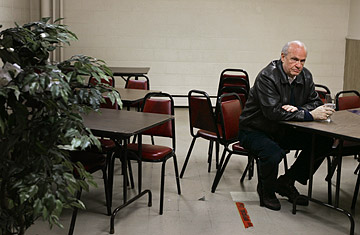
Republican presidential candidate Fred Thompson in Mason City, Iowa
On the rather late date of Sept. 4, 2007, Fred Thomspon sat on Jay Leno's couch and declared that he was running for President, adding, "I don't think people are going to say, 'That guy would make a very good President, but he just didn't get in soon enough.'" Thompson was right. It wasn't the lateness of his entry — fully six months after most of his rivals — that killed his campaign. It was the candidate's own perceived apathy.
In a jumbled field, the former Tennessee Senator-cum-actor seemed an ideal heir to Ronald Reagan's legacy: his eight-year Senate record on taxes, social issues and foreign policy were in lockstep with conservative tenets, earning him an 86% lifetime rating from the American Conservative Union, compared to front-runner John McCain, an Arizona Senator who has an 82% rating. He understood that unwavering conservatism was his best bet with voters and even blared it from the side of his campaign bus: "The Clear Conservative Choice: Hands Down!" But from Sept. 5 until today, when Thompson announced he was ending his candidacy, he was plagued with complaints that he didn't seem to want the presidency enough — or at least not enough to actually campaign for it.
His withdrawal announcement was characteristically short and low in energy, just three sentences long: "Today I have withdrawn my candidacy for President of the United States," Thompson said in an e-mailed statement. "I hope that my country and my party have benefited from our having made this effort. Jeri and I will always be grateful for the encouragement and friendship of so many wonderful people."
In an interview with TIME shortly before the Iowa caucus, Thompson spoke of his long odds in the state and reminisced about his first Senate race in 1994, noting how his last-minute zigzagging across Tennessee took him from underdog to winner. "It's the way we campaigned in Tennessee, where we went from 20 points behind to 20 points ahead all in 20 days," Thompson said, adding that he planned to deploy the same kind of "focus campaigning" in Iowa.
Of course, that interview was conducted by telephone. Thompson was still at home in suburban Virginia. That same weekend a reporter spotted him shopping with his wife at Neiman Marcus. And while he eventually did make it to Iowa and doggedly crisscrossed the state, a few focused weeks couldn't upend the months of legwork and retail politicking done by his rivals.
Besides a lack of energy, Thompson was plagued by tactical missteps out of the gate. He had to defend his stance on abortion after the Los Angeles Times reported that, during his time as a lobbyist, he'd done work for a pro-choice group. During a stop in Florida his seeming ignorance over a controversial proposal to allow oil and gas exploration in the Everglades earned him criticism. And while the rest of the G.O.P. field ran on a platform of 'I'll keep you safe, I'll cut your taxes and I'll overturn Roe v. Wade' (rotate pledge depending on candidate), Thompson centered his first policy rollout in early October on the third rail of American politics, Social Security reform.
To Thompson's credit, that proposal and his detailed plans to overhaul Medicare and Medicaid, streamline government, expand free trade and reform the tax code were all meatier than anything his rivals bothered to produce. But Thompson was content to roll out his policies like basketballs and let other people pick them up and play with them. As TIME's Joe Klein wrote, Thompson seemed to be campaigning from a hammock, and his lack of urgency made him an easy target for late night hosts and Saturday Night Live skits.
After a distant third-place finish in Iowa, Thompson took sixth in New Hampshire, garnering just 1% of the vote. In Michigan and Nevada he placed fifth, and in South Carolina, a state where he'd invested the bulk of his time and energy outside of Iowa, Thompson was a distant third with 16% of the vote. His non-concession-concession speech — in which many pundits wryly noted that Thompson never looked happier — left many scratching their heads, wondering if he was dropping out or pushing on. He, in fact, said only that he planned on taking a break to visit his sick mother in Tennessee. But with little money left, he had little hope of pushing on.
From here it's expected that Thompson will endorse his old colleague McCain. Indeed, he has already helped McCain: by staying in the race he drew Evangelical support from former Arkansas Mike Huckabee, helping McCain to a win in South Carolina. Though if McCain is envisioning all-night bus tours and tireless stumping from Thompson, he might be making the same mistake many Republicans did when Thompson got into the race: he may be expecting a little too much.
